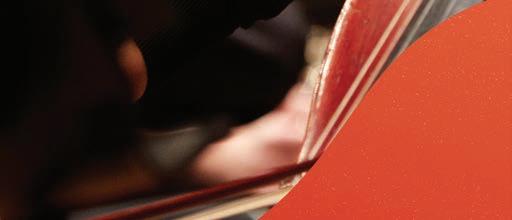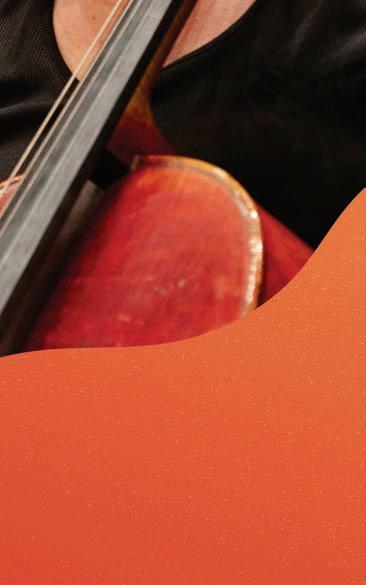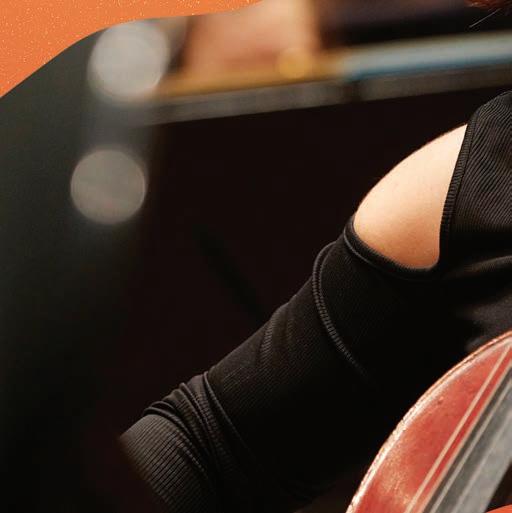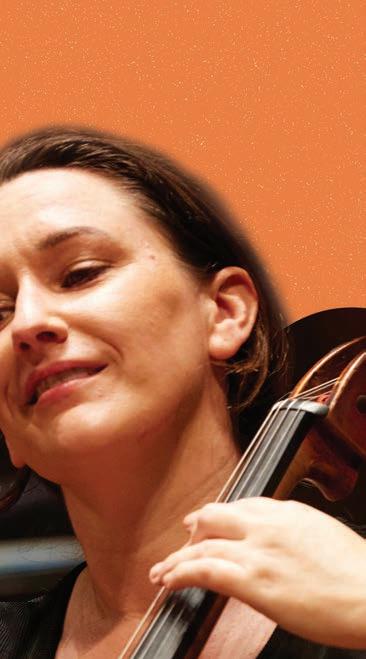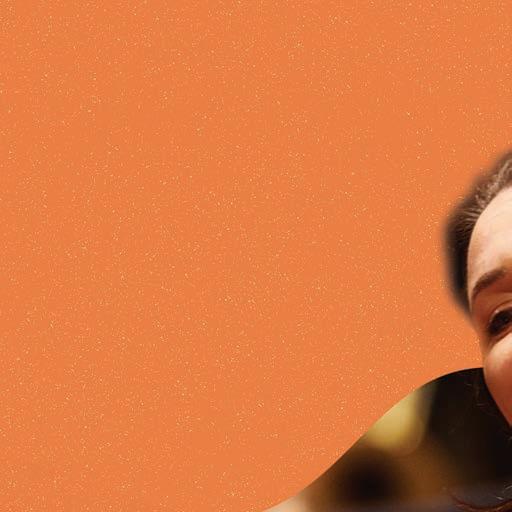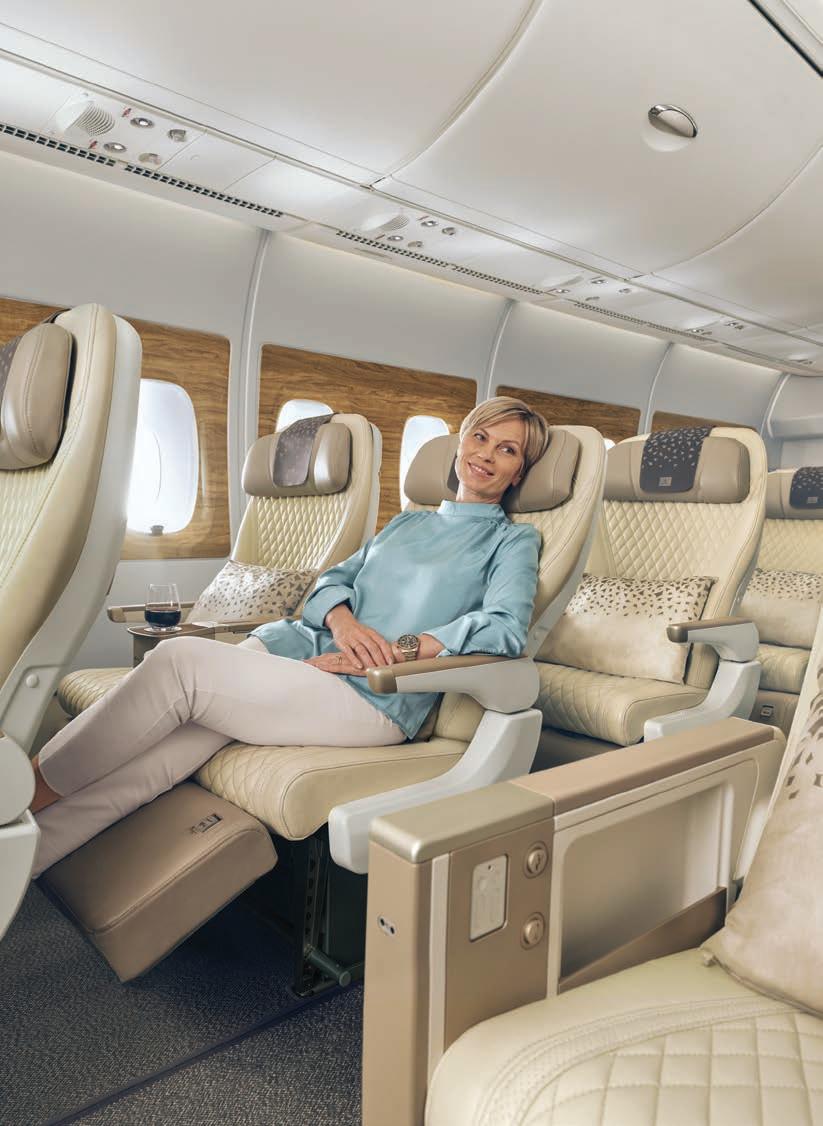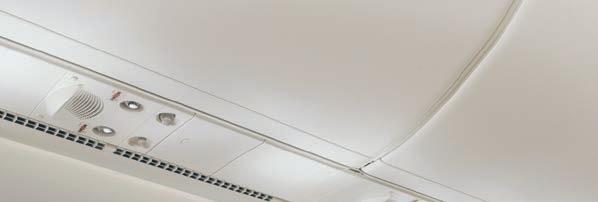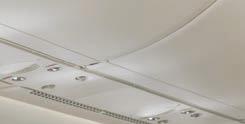Acknowledging Country
Australia, the MSO has developed a musical Acknowledgment of Country with music composed by Yorta Yorta composer Deborah Cheetham Fraillon AO, featuring Indigenous languages from across Victoria. Generously supported by Helen Macpherson Smith Trust and the Commonwealth Government through the Australian National Commission for UNESCO, the MSO is working in partnership with Short Black Opera and Indigenous language custodians who are generously sharing their cultural knowledge.
The Acknowledgement of Country allows us to pay our respects to the traditional owners of the land on which we perform in the language of that country and in the orchestral language of music.
from a land which has been nurtured by the traditional owners for more than 2000 generations. When we acknowledge country we pay respect to the land and to the people in equal measure.
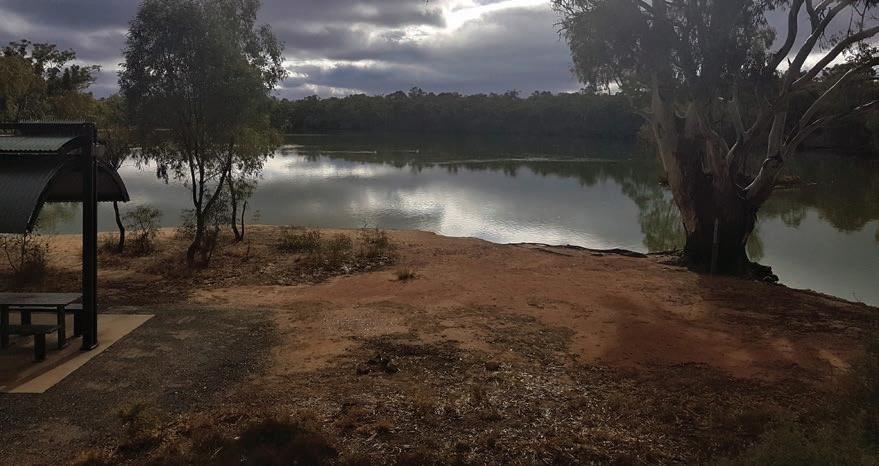
As a composer I have specialised in coupling the beauty and diversity of our Indigenous languages with the power and intensity of classical music. In order to compose the music for this Acknowledgement of Country Project I have had the great privilege of working with no fewer than eleven ancient languages from the state of Victoria, including the language of my late Grandmother, Yorta Yorta woman Frances McGee. I pay my deepest respects to the elders and ancestors who are represented in these songs of acknowledgement and to the language custodians who have shared their knowledge and expertise in providing each text.

I am so proud of the MSO for initiating this landmark project and grateful that they afforded me the opportunity to make this contribution to the ongoing quest of understanding our belonging in this land.
 — Deborah Cheetham Fraillon AO
— Deborah Cheetham Fraillon AO
Australian National Commission for UNESCO United Nations Educational, Scientific and Cultural Organization
4
Melbourne Symphony Orchestra
Established in 1906, the Melbourne Symphony Orchestra is Australia’s pre-eminent orchestra and a cornerstone of Victoria’s rich, cultural heritage.
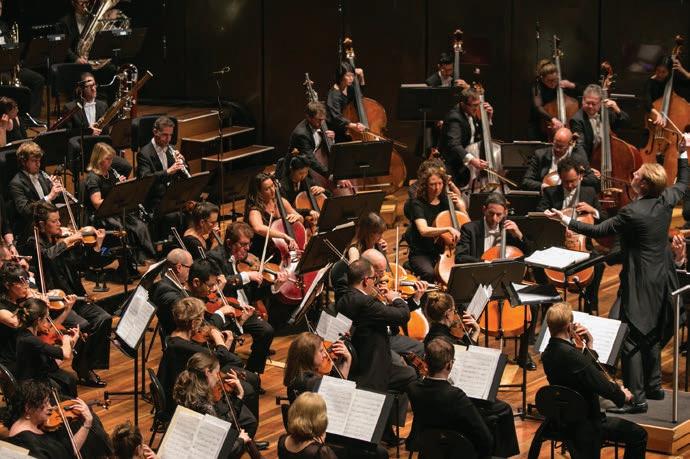
Each year, the MSO engages with more than 5 million people, presenting in excess of 180 public events across live performances, TV, radio and online broadcasts, and via its online concert hall, MSO.LIVE, with audiences in 56 countries.
With a reputation for excellence, versatility and innovation, the MSO works with culturally diverse and First Nations leaders to build community and deliver music to people across Melbourne, the state of Victoria and around the world.
In 2023, the MSO’s Chief Conductor, Jaime Martín continues an exciting new phase in the Orchestra’s history. Maestro Martín joins an Artistic Family that includes Principal Guest Conductor Xian Zhang, Principal Conductor in Residence, Benjamin Northey, Conductor Laureate, Sir Andrew Davis CBE, Cybec Assistant Conductor Fellow, Carlo Antonioli, MSO Chorus Director, Warren Trevelyan-Jones, Soloist in Residence, Siobhan Stagg, Composer in Residence, Mary Finsterer, Ensemble in Residence, Gondwana Voices, Cybec Young Composer in Residence, Melissa Douglas and Young Artist in Association, Christian Li.
The Melbourne Symphony Orchestra respectfully acknowledges the people of the Eastern Kulin Nations, on whose un-ceded lands we honour the continuation of the oldest music practice in the world.




THE KREUTZER SONATA | 26 March 5
Cellist Michelle Wood has had a remarkably varied career as one of Australia’s finest chamber and orchestral musicians, alongside her role as a cellist with the Melbourne Symphony Orchestra.
As a founding member of the Tinalley Quartet, she was a winner of the 9th Banff International String Quartet Competition, leading to national & international acclaim. Performances with the Quartet over 14 years led to both national and international acclaim, and tours to some of the finest concert halls in the world; including the Berlin Konzerthaus, Concertgebouw, Musikverein, and Frankfurt AlteOper. Alongside the quartet`s illustrious career, Michelle`s chamber music performances have also extended to appearances as guest artist with the Australian String Quartet, Australia Ensemble, Stargaze Ensemble in Berlin, and festivals both in Australia and Europe. She has been broadcast widely on radio both in Australia and Europe, and has recorded to great acclaim with both Tinalley Quartet (Ravel & Debussy Quartets for Decca, and Haydn Op.20) and violinist Kristian Winther (Tzigane).
Michelle has also had the honour to perform and tour as part of the Australian World Orchestra in seasons with Zubin Mehta and Riccardo Mutti; most recently again as Principal cellist with Maestro Mehta in 2022 for concerts at Edinburgh Festival and the BBC Proms.

In 2018 Michelle became co-Artistic director of Concerts Sans Frontières (CSF)an exciting new international concert series that had its inaugural year presented at the prestigious Australian Embassy in Paris. The series existed as a collective of internationally renowned Australian classical musicians and their international friends and colleagues, coming together from all corners of the world to give classical music lovers rare and free access to remarkable concerts.
Michelle is a passionate teacher, and is involved in mentoring and teaching many young chamber musicians and cellists. She has worked with ensembles and students from the University of Melbourne, Australian National Academy of Music, Melbourne Youth Orchestra programs and at the Australian Youth Orchestra`s National Music Camp as well as Fellowship and Academy Programs with the Melbourne Symphony. Michelle performs on a instrument made in 1849 by Charles Boullangier.
Michelle Wood curator
THE
SONATA | 26 March 6
KREUTZER
Distilled on-site in Southbank, Patient Wolf gins are big, bold, and incredibly smooth. Enjoy 10% off your gin purchase with the code MSO10.





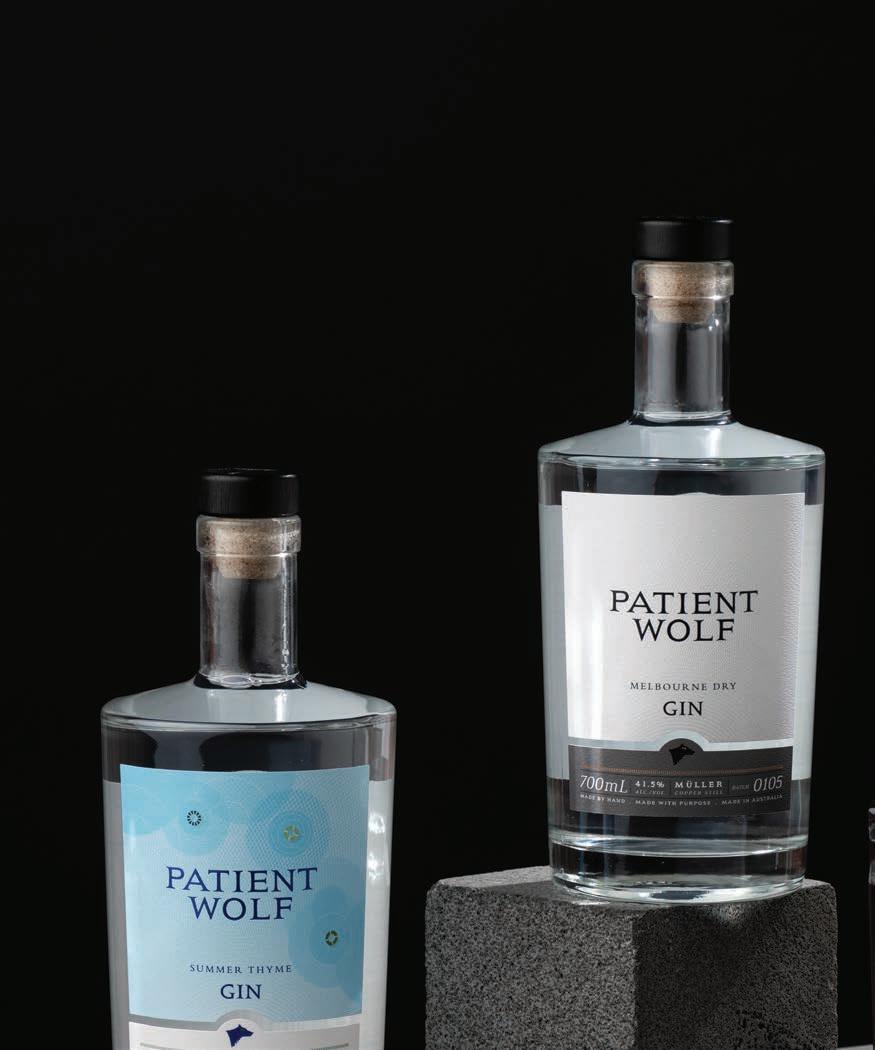
official gin of the World class music. It just makes sense. world class gin.
Redeem online or at the distillery bar in Southbank. patientwolfgin.com
A note from the curator
The Kreutzer Sonata
Somewhere amongst the dark, enforced ‘quiet’ of 2020, a dear friend used to send me music to listen to distract me from the heaviness of each day. It had been a difficult few years personally, and even as a musician, it surprised me how cathartic it was to immerse myself in simply… listening. I could be uplifted by a song, or sink into the passion and power of a symphony. And it didn’t matter if it was by Rameau, Ravel or Radiohead.
So when I was given the opportunity to curate this concert, it felt only fitting to assemble works that I felt captured the essence of true, raw emotion. An ode to the cathartic powers of music. And in the case of three works you will hear, each happen to find their source in Beethoven’s Kreutzer Sonata – the final work in the program.
Leo Tolstoy had once written that “music is the shorthand of emotion,”; highlighting the power of music to express and communicate the most complex emotional states. Just as
Program Notes
The violinist Rodolphe Kreutzer never played the sonata Ludwig van Beethoven dedicated to him, but his name has stuck, even magnified by later literary and musical works inspired by it. The link between Beethoven’s Kreutzer Sonata for violin and Leoš Janáček’s Kreutzer Sonata for string quartet runs through Leo Tolstoy (1828–1910). His 1889 novella The Kreutzer Sonata took its title from Beethoven, and Janáček’s quartet is a musical interpretation of
shorthand uses symbols to represent words, music has the ability to express emotions in a way that is more direct and powerful than language. It is what we all feel as composers take us on intense, emotional musical journeys.
In the context of Tolstoy’s 1889 novella
The Kreutzer Sonata, this quote takes on a particular significance. The novella is a tragic story about jealousy, love, and marriage, and it revolves around a performance of Beethoven’s Kreutzer Sonata. The protagonist, Pozdnyshev, sees the sonata as a representation of the destructive power of love, and becomes convinced that his wife’s feelings for him are a sham. In writing such a link, Tolstoy also clearly believed that the Beethoven’s sonata could be a representation of the passionate and destructive aspects of love, and that it expressed the same emotions that Pozdnyshev feels throughout the novella.
Some 34 years later in 1923, Leoš Janáček composed his String Quartet No.1, also subtitled Kreutzer sonata. His
Tolstoy’s story. So Beethoven inspired Tolstoy, who inspired Janáček.
Tolstoy tells of an overnight train journey shared with a man, Pozdnyshev, who killed his wife. In a dazzling monologue, he offers frightening insights into
love, marriage, sexuality, abstinence, parenthood, the purpose of life, and the ultimate fate of humanity. Then he explains in detail how he stabbed his wife to death after suspecting she was having an affair with a violinist with whom she played the famous Beethoven sonata.
THE KREUTZER SONATA | 26 March 8
inspiration is undoubtedly driven by his passion for Tolstoy’s tale, but given Janáček’s own bizarre and complicated love life (writing over 1000 love letters to a married woman 40 years his junior) we can assume he also found motivation in its subject matter. We’ll hear a slightly more expanded version for nonet in this concert, which only serves to amplify the intense, almost operatic writing Janáček is renowned for.
Prior to us ending the concert with the quintet arrangement of Beethoven’s original Sonata (arranged anonymously for string quintet and published in 1832), we will hear Anna Clyne’s work Shorthand for solo cello and string quintet. It takes its name directly from Tolstoy’s quote, whilst also cleverly utilising themes from both Beethoven and Janáček’s compositions. Her writing is perhaps the epitome of ‘the female gaze’ on such tortured subject matter, and showcases the cello in its most passionate and beautiful form.
Which brings me to the opening piece on the program. Bach’s mighty ‘Chaconne’ – the final movement from his Partita No.2 in D minor for solo violin – arranged for two cellos by Claudio Jaffe & Johanne Perron. This was the last work I added to this program, but one I felt completely captured the world of feeling Tolstoy refers to in his quote; a true world of emotion, encapsulated in 14 perfect minutes of music. In the words of Brahms: ‘The Chaconne is for me one of the most wonderful, incomprehensible pieces of music. On a single staff, for a small instrument, the man writes a whole world of the deepest thoughts and the most powerful feelings.’
I sincerely hope this concert brings our listeners on the same cathartic journey. It has certainly brought me back to all of the reasons why I love music so much… just as my dear friend reminded me.
© Michelle Wood 2023
Music was important to Tolstoy, who found its power both marvelous and troubling. “What is music? What does it do? And why does it do what it does?” Pozdnyshev asks in the novella. “Music carries me immediately and directly into the mental condition in which the man was who composed it. My soul merges with his and together with him I pass from one condition into another. Why this happens I don’t know.”
Alongside the Beethoven and Janáček, we hear the D-minor Chaconne by Johann Sebastian Bach and a recent
work by Anna Clyne inspired by Tolstoyan thinking. The three older works are each slightly transformed from the originals: the Bach is transcribed for two cellos (by Claudio Jaffe and Johanne Perron), the Janáček is expanded for nine players (by cellist Michelle Wood), and the Kreutzer Sonata is played in an unusual arrangement for quintet that may have been prepared by Beethoven himself.
THE KREUTZER SONATA | 26 March 9
JOHANN SEBASTIAN BACH (1685–1750)
Chaconne from Partita No.2 in D minor for Solo Violin, BWV 1004
(Arranged for two cellos by Claudio Jaffe and Johanne Perron)
This movement stands so far beyond all others of its kind that it is often known simply as “the” Chaconne. The term first referred to a 16th century Spanish dance, perhaps with roots in the Americas, built on a kind of mantric repetition. By Bach’s day, it was understood as a variation form built on a repeated ground bass. In the strictest sense, this is impossible to convey on a solo violin, as it can’t play a bassline or sustain two independent voices on its own. But shrewd writing with chords and arpeggios can create the illusion of multiple things happening at once, making the violin sound like an ensemble unto itself.
Unlike Tolstoy, Bach had no apparent qualms about family life, happily marrying twice and fathering 20 children. But one story ties the Chaconne to the unexpected death of Bach’s first wife, Maria Barbara, in 1720 (from natural causes). Returning to his home in Köthen after a lengthy trip abroad, Bach found his wife “dead and buried, though he had left her hale and hearty on his departure,” their son Carl Philipp Emanuel recalled years later. “The news that she had been ill and died reached him only when he entered his own house.”
The story resonates with the grief many people sense in the Chaconne, though only the thinnest evidence actually connects the piece with Bach’s sudden loss. It is true he copied out the Sonatas and Partitas the same year Maria Barbara died, but most of the music probably originated years earlier.
In either case, consider the form of the Chaconne: elaborate variations over a repeated chord progression, sometimes
present, sometimes only implied. At its heart is tension between uniformity and variety, between staying and going, between confinement and release. You might hear it as an exploratory journey from a central idea, or as a mournful dance trying to shed an unbearable weight.
© Anthony Cane 2001
LEOŠ JANÁČEK (1854–1928)
String Quartet No.1 Kreutzer Sonata (Arranged for string nonet by Michelle Wood)
I. Adagio–Con moto
II. Con moto
III. Con moto–Vivo–Andante
IV. Con moto–Adagio–Più mosso
Janáček’s music is hugely distinctive –it’s Romantic, it’s modern, but most of all it sounds like Janáček – bold, dramatic, and surprising.
He was something of a Russophile, and began to adapt The Kreutzer Sonata in 1909 as a piano trio (now lost) for a Tolstoy evening at an artists’ club in Brno. He rewrote it for string quartet over a few short weeks in the fall of 1923. In between, the middle-aged and longmarried Janáček had fallen in love with Kamila Stösslová, the 26-year-old wife of an antiques dealer – something that must have reminded him of Tolstoy’s story. In the following years, Janáček and Stösslová corresponded frequently, which inspired a second string quartet called Intimate Letters. In August of 1928, he went on vacation with her, and died shortly thereafter from pneumonia.
He wrote the Kreutzer Sonata for the Czech Quartet and dedicated it to Stösslová. Many critics have suggested that, in contrast with Tolstoy’s thoroughly masculine narrative, Janáček’s music inhabits the murdered woman’s point
| 26 March 10
THE KREUTZER SONATA
of view. (It is now known that Tolstoy’s wife, Sophia Tolstaya, was deeply bothered by the novella and wrote her own rebuttal called Whose Fault?) The quartet doesn’t directly narrate events of the book, but it feels like the same story – intense, conflicted, discursive, and argumentative. It doesn’t sound anything like Beethoven, but musicians have identified subtle allusions to the original sonata, particularly in the opening theme of the third movement.
In largescale form, the quartet is cyclical, with the last movement returning to rework the first movement’s declamatory opening. Perhaps this is the murder itself, which Pozdnyshev plays back in his memory. “For an instant, only an instant, before the action I had a terrible consciousness that I was killing, had killed, a defenseless woman, my wife! … Having plunged the dagger in, I pulled it out immediately, trying to remedy what had been done and to stop it… But the blood rushed from under her corset. Only then did I understand that it could not be remedied.” Rarely has a literary idea been so effectively and chillingly translated into chamber music.
ANNA CLYNE (born 1980)
Shorthand
Born in London, Anna Clyne has served as composer in residence for the Philharmonia Orchestra, Trondheim Symphony, Baltimore Symphony, Chicago Symphony, and Scottish Chamber Orchestra. In 2015 she was nominated for a Grammy Award for best contemporary classical composition.
Shorthand, for cello and strings, was premiered by Karen Ouzounian and The Knights in July 2020. The title refers to a comment by Tolstoy: “Music is the shorthand of emotion. Emotions, which let themselves be described in
words with such difficulty, are directly conveyed to man in music, and in that is its power and significance.” He explored similar ideas in The Kreutzer Sonata and other writings.
Clyne writes: “The piece references two themes from Beethoven’s Kreutzer Sonata for violin and piano: the opening theme, as well as a second theme that Janáček also incorporated in his own String Quartet No.1, Kreutzer Sonata. That second Beethoven theme inspires the opening material for Shorthand.” The piece is dedicated to the composer’s husband, Jody Elff.
LUDWIG VAN BEETHOVEN (1770–1827)
Violin Sonata No.9 in A, Op.47 Kreutzer (Arranged by the composer for String Quintet)
Finally we arrive at the piece that started it all. “Ugh! It’s a terrible thing, that sonata,” Pozdnyshev says in Tolstoy’s story. “It was as if new feelings, new possibilities, of which I had till then been unaware, had been revealed to me.”
Beethoven wrote most of the Sonata in the spring of 1803 and premiered it with George Bridgetower, a 24-yearold English violinist of Afro-Caribbean ancestry. With the premiere going ahead just hours after Beethoven finished writing the piece, there was no time to rehearse, let alone copy out the entire violin part, so Bridgetower sightread over Beethoven’s shoulder at the keyboard. Their performance must have had quite an improvisational, fly-by-night energy, nothing like the polish we now expect in classical concerts (many 19 th century premieres were probably like that). Beethoven was thrilled. He affectionately scrawled a dedication to “the mulatto Brischdauer, a complete lunatic.”
Sometime later, the two friends had a falling out, apparently after Bridgetower
THE KREUTZER SONATA | 26 March 11
made a crude comment about a woman Beethoven admired. Just like he would scratch out the Eroica Symphony’s dedication to Napoleon, he retracted the sonata’s dedication to Bridgetower. Both men, in different ways, betrayed Beethoven’s moral ideals. Upon publication, the sonata’s dedication went to a different violinist, Rodolphe Kreutzer. Suddenly prim, Beethoven wrote to his publisher: “I prefer his modesty and natural behavior.” But Kreutzer found it confusing and unplayable.
Beethoven described the piece’s style as “like that of a concerto.” And it is – not only in virtuosity, but also in its slightly unhinged energy and expressive intensity. Tolstoy did not hit on it at random. “How can that first presto be played in a drawing-room among ladies in low-necked dresses?” Pozdnyshev demands to know. In his estimation, the following movements are inferior to the first: “the beautiful, but common and unoriginal andante with trite variations, and the very weak finale.” Most listeners will be kinder in their appraisal, but perhaps the astute Tolstoy sensed that Beethoven had written the finale a year earlier for a different sonata, and appended it here in a hurry.
Th string quintet arrangement heard on this concert was published by Nikolaus Simrock in 1832, five years after Beethoven’s death. The arranger is unknown, but it might have been completed at some point by Beethoven himself. Perhaps he wanted to find a new outlet for the piece after the fight with Bridgetower and rejection by Kreutzer, or perhaps he had wanted a larger canvass for this music all along.
© Benjamin Pesetsky 2023
THE
| 26 March 12
KREUTZER SONATA
My first experience with the MSO was when I was very young….We were taken to a school concert, in the Melbourne Town Hall, conducted by Sir Bernard Heinze.… and I can honestly say that the MSO has never been out of my life since.


A Lifetime of Music
From nourishing the soul, lifting the spirits, or igniting passion, music has the ability to evoke the vast expanse of human emotions like nothing else.
For 117 years, our great Orchestra has had the honour and privilege of creating these moving musical moments – delivering a lifetime of music to generations of Victorians. But we can’t do this without your support.
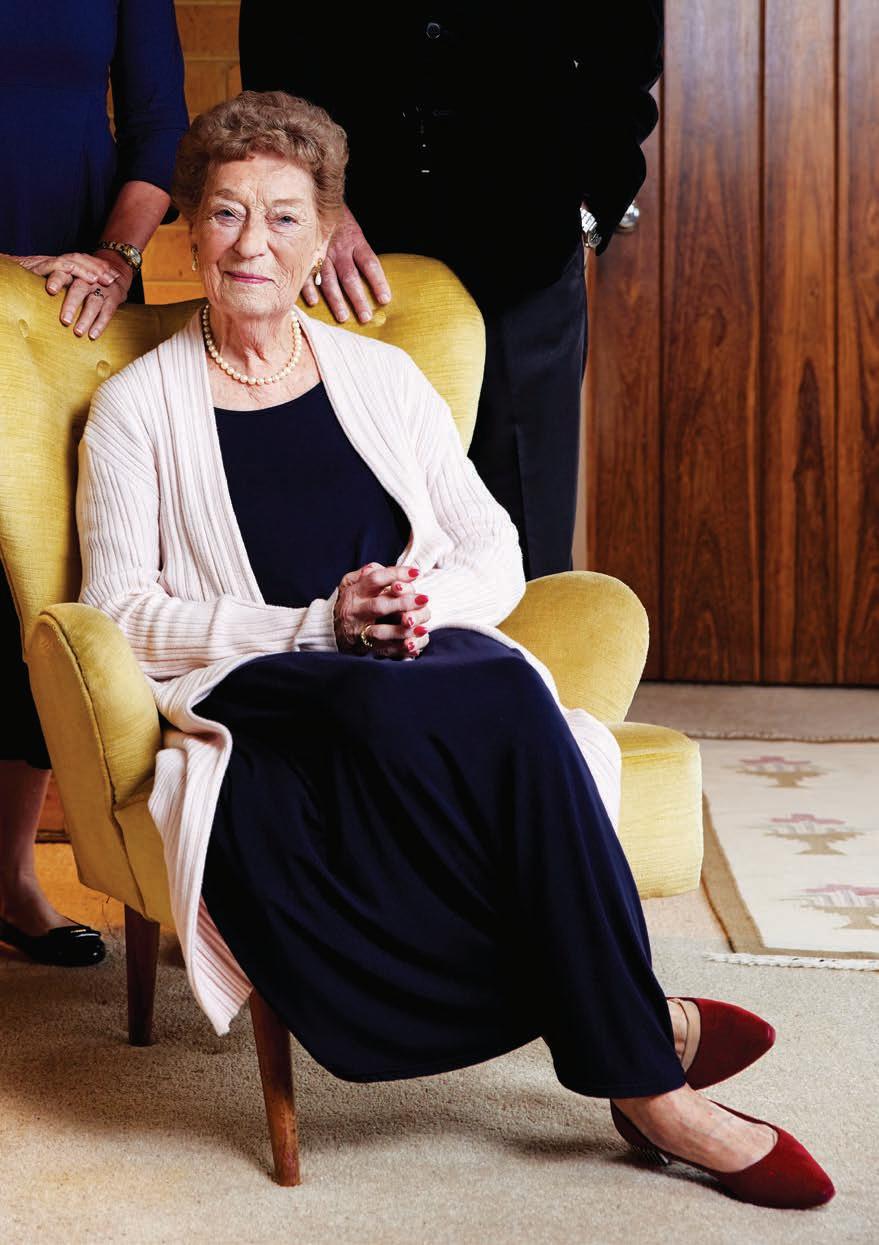
A gift today to the MSO will help us deliver our annual suite of concerts and programs for audiences of all ages and musical tastes.
Each and every gift, no matter the size, makes an impact. Please join us on this important journey, and make a donation today by scanning the QR code.
Thank you for your support.
“ ”
Mary Armour – MSO Patron and lifelong concert-goer.
Supporters
MSO PATRON
The Honourable Linda Dessau AC, Governor of Victoria
CHAIRMAN’S CIRCLE
Mr Marc Besen AC and the late Mrs Eva Besen AO
Gandel Foundation
The Gross Foundation
Di Jameson and Frank Mercurio
Harold Mitchell Foundation
Lady Potter AC CMRI
The Cybec Foundation
The Pratt Foundation
The Ullmer Family Foundation
Anonymous
ARTIST CHAIR BENEFACTORS
Chief Conductor Jaime Martín Mr Marc
Besen AC and the late Mrs Eva Besen AO
Cybec Assistant Conductor Chair
Carlo Antonioli The Cybec Foundation
Concertmaster Chair Dale Barltrop
David Li AM and Angela Li
Assistant Concertmaster
Tair Khisambeev Di Jameson and Frank Mercurio
Young Composer in Residence
Melissa Douglas The Cybec Foundation
2023 Composer in Residence
Mary Finsterer Kim Williams AM
PROGRAM BENEFACTORS
MSO Now & Forever Fund: International Engagement Gandel Foundation
Cybec 21st Century Australian Composers
Program The Cybec Foundation
Digital Transformation The Margaret
Lawrence Bequest – Managed by Perpetual, Perpetual Foundation – Alan (AGL) Shaw Endowment
First Nations Emerging Artist Program
The Ullmer Family Foundation
East meets West The Li Family Trust, National Foundation for Australia-China Relations
MSO Live Online Crown Resorts Foundation, Packer Family Foundation
MSO Education Anonymous
MSO Academy Di Jameson and Frank Mercurio
MSO For Schools Crown Resorts Foundation, Packer Family Foundation, The Department of Education and Training, Victoria, through the Strategic Partnerships Program
Melbourne Music Summit The Department of Education and Training, Victoria, through the Strategic Partnerships Program
MSO Regional Touring Creative Victoria, Freemasons Foundation Victoria, Robert Salzer Foundation, The Sir Andrew & Lady Fairley Foundation
The Pizzicato Effect Supported by Hume City Council’s Community Grants program, The Marian and E.H. Flack Trust, Flora & Frank Leith Charitable Trust, Australian Decorative And Fine Arts Society, Anonymous
Sidney Myer Free Concerts Supported by the Sidney Myer MSO Trust Fund and the University of Melbourne
PLATINUM PATRONS $100,000+
Mr Marc Besen AC and the late Mrs Eva Besen AO
The Gandel Foundation
The Gross Foundation
Di Jameson and Frank Mercurio
David Li AM and Angela Li
Lady Primrose Potter AC CMRI
The Ullmer Family Foundation
Anonymous (1)
VIRTUOSO PATRONS $50,000+
Margaret Jackson AC
Weis Family
Anonymous (1)
14 Supporters
IMPRESARIO PATRONS $20,000+
Harold Bentley
The Hogan Family Foundation
David Krasnostein AM and Pat Stragalinos
Paul Noonan
Opalgate Foundation
Lady Marigold Southey AC
Kim Williams AM
Anonymous (1)
MAESTRO PATRONS $10,000+
Christine and Mark Armour
Margaret Billson and the late Ted Billson
Shane Buggle and Rosie Callanan
Krystyna Campbell-Pretty AM
Andrew Dudgeon AM
Colin Golvan AM KC and Dr Deborah Golvan
Danny Gorog and Lindy Susskind
Peter Lovell
Maestro Jaime Martín
Ian and Jeannie Paterson
Elizabeth Proust AO and Brian Lawrence
Yashian Schauble
Glenn Sedgwick
The Sun Foundation
David and Gai Taylor
Athalie Williams and Tim Danielson
Lyn Williams AM
Wingate Group
Jason Yeap OAM – Mering Management Corporation
Anonymous (2)
PRINCIPAL PATRONS $5,000+
Mary Armour
John and Lorraine Bates
Barbara Bell in memory of Elsa Bell
Bodhi Education Fund (East meets West)
Julia and Jim Breen
Oliver Carton
John Coppock OAM and Lyn Coppock
Perri Cutten and Jo Daniell
Ann Darby in memory of Leslie J. Darby
Mary Davidson and the late Frederick Davidson AM
The Dimmick Charitable Trust
Tim and Lyn Edward
Jaan Enden
Bill Fleming
Dr John and Diana Frew
Susan Fry and Don Fry AO
Sophie Galaise and Clarence Fraser
Geelong Friends of the MSO
Jennifer Gorog
Dr Rhyl Wade and Dr Clem Gruen
Cecilie Hall and the late Hon Michael Watt KC
Hilary Hall in memory of Wilma Collie
Louis J Hamon OAM
Nereda Hanlon and Michael Hanlon AM
Dr Alastair Jackson AM
Merv Keehn and Sue Harlow
Suzanne Kirkham
Dr Elizabeth A Lewis AM
Sherry Li
Dr Caroline Liow
Gary McPherson
The Mercer Family Foundation
Marie Morton FRSA
Anne Neil
Hyon-Ju Newman
Newton Family in memory of Rae Rothfield
Ken Ong OAM
Bruce Parncutt AO
Sam Ricketson and Rosemary Ayton
Andrew and Judy Rogers
Rosemary and the late Douglas Meagher
The Rosemary Norman Foundation
Guy Ross
The Kate and Stephen Shelmerdine Family Foundation
Helen Silver AO and Harrison Young
Anita Simon
Brian Snape AM
Dr Michael Soon
Dawna Wright and Peter Riedel
Anonymous (2)
15
Supporters
ASSOCIATE PATRONS $2,500+
Carolyn Baker
Marlyn Bancroft and Peter Bancroft OAM
Sascha O. Becker
Janet H Bell
Alan and Dr Jennifer Breschkin
Patricia Brockman
Drs John D L Brookes and Lucy V Hanlon
Stuart Brown
Lynne Burgess
Dr Lynda Campbell
Janet Chauvel and the late Dr Richard Chauvel
Breen Creighton and Elsbeth Hadenfeldt
The Cuming Bequest
Katherine Cusack
Leo de Lange
Sandra Dent
Barry Fradkin OAM and Dr Pam Fradkin
Carrillo Gantner AC and Ziyin Gantner
Kim and Robert Gearon
Janette Gill
R Goldberg and Family
Goldschlager Family Charitable Foundation
Catherine Gray
Hartmut and Ruth Hofmann
Paul and Amy Jasper
John Jones
LRR Family Trust
Margaret and John Mason OAM
H E McKenzie
Dr Isabel McLean
Ian Merrylees
Patricia Nilsson
Dr Paul Nisselle AM and Sue Nisselle
Alan and Dorothy Pattison
Sue and Barry Peake
David and Nancy Price
Peter Priest
Ruth and Ralph Renard
Tom and Elizabeth Romanowski
Liliane Rusek and Alexander Ushakoff
Jeffrey Sher KC and Diana Sher OAM
Barry Spanger
Steinicke Family
Peter J Stirling
Jenny Tatchell
Clayton and Christina Thomas
Elaine Walters OAM
Janet Whiting AM
Nic and Ann Willcock
Anonymous (4)
PLAYER PATRONS $1,000+
Dr Sally Adams
Anita and Graham Anderson
Australian Decorative & Fine Arts Society
Geoffrey and Vivienne Baker
Michael Bowles and Alma Gill
Joyce Bown
Miranda Brockman
Nigel Broughton and Sheena Broughton
Suzie Brown OAM and the late Harvey Brown
Dr Robin Burns and Dr Roger Douglas
Ronald and Kate Burnstein
Kaye Cleary
John and Mandy Collins
Andrew Crockett AM and Pamela Crockett
Dr Daryl and Nola Daley
Panch Das and Laurel Young-Das
Michael Davies
Natasha Davies for the Trikojus Education Fund
Rick and Sue Deering
Suzanne Dembo
John and Anne Duncan
Jane Edmanson OAM
Diane Fisher
Grant Fisher and Helen Bird
Alex Forrest
Applebay Pty Ltd
David and Esther Frenkiel OAM
Anthony Garvey and Estelle O’Callaghan
David I Gibbs AM and Susie O’Neill
Sonia Gilderdale
Dr Celia Godfrey
Dr Marged Goode
16
Supporters
Dr Sandra Hacker AO and Ian Kennedy AM
Dawn Hales
David Hardy
Tilda and the late Brian Haughney
Susan and Gary Hearst
Cathy Henry
Dr Keith Higgins
Anthony and Karen Ho
Peter and Jenny Hordern
Katherine Horwood
Penelope Hughes
Shyama Jayaswal
Basil and Rita Jenkins
Sandy Jenkins
Sue Johnston
John Kaufman
Angela Kayser
Drs Bruce and Natalie Kellett
Dr Anne Kennedy
Tim Knaggs
Dr Jerry Koliha and Marlene Krelle
Jane Kunstler
Ann Lahore
Kerry Landman
Kathleen and Coran Lang
Janet and Ross Lapworth
Bryan Lawrence
Phil Lewis
Andrew Lockwood
Elizabeth H Loftus
Chris and Anna Long
Gabe Lopata
John MacLeod
Eleanor & Phillip Mancini
Aaron McConnell
Wayne McDonald and Kay Schroer
Ray McHenry
John and Rosemary McLeod
Don and Anne Meadows
Dr Eric Meadows
Professor Geoffrey Metz
Sylvia Miller
Ian Morrey and Geoffrey Minter
Dr Anthony and Dr Anna Morton
Laurence O’Keefe and Christopher James
Roger Parker
Ian Penboss
Eli Raskin
Jan and Keith Richards
James Ring
Dr Peter Rogers and Cathy Rogers OAM
Dr Ronald and Elizabeth Rosanove
Marie Rowland
Jan Ryan
Martin and Susan Shirley
P Shore
John E Smith
Dr Peter Strickland
Dr Joel Symons and Liora Symons
Russell Taylor and Tara Obeyesekere
Geoffrey Thomlinson
Frank Tisher OAM and Dr Miriam Tisher
Andrew and Penny Torok
Christina Turner
Ann and Larry Turner
Leon and Sandra Velik
The Reverend Noel Whale
Edward and Paddy White
Terry Wills Cooke OAM and the late Marian Wills Cooke
Robert and Diana Wilson
Richard Withers
Lorraine Woolley
Youth Music Foundation
Shirley and Jeffrey Zajac
Anonymous (12)
OVERTURE PATRONS $500+*
Margaret Abbey PSM
Jane Allan and Mark Redmond
Mario M Anders
Jenny Anderson
Peter Batterham
Benevity Australia Online Giving Foundation
Peter Berry and Amanda Quirk
Dr William Birch AM
Allen and Kathryn Bloom
Linda Brennan
17 Supporters
Dr Robert Brook
Elizabeth Brown
John Brownbill
Roger and Coll Buckle
Cititec Systems
Charmaine Collins
Dr Sheryl Coughlin and Paul Coughlin
Judith Cowden in memory of violinist
Margaret Cowden
Dr Oliver Daly and Matilda Daly
Merrowyn Deacon
Bruce Dudon
Melissa and Aran Fitzgerald
Brian Florence
Elizabeth Foster
Mary Gaidzkar
Simon Gaites
Dr Mary-Jane Gething
David and Geraldine Glenny
Hugo and Diane Goetze
Louise Gourlay OAM
Robert and Jan Green
George Hampel AM KC and
Felicity Hampel AM SC
Geoff Hayes
Jim Hickey
William Holder
Clive and Joyce Hollands
Rod Home
R A Hook
Gillian Horwood
Geoff and Denise Illing
Wendy Johnson
John and Christine Keys
Belinda and Malcom King
Professor David Knowles and Dr Anne McLachlan
Pauline and David Lawton
Paschalina Leach
Dr Jenny Lewis
Sharon Li
The Podcast Reader
Janice Mayfield
Shirley A McKenzie
Dr Alan Meads and Sandra Boon
Marie Misiurak
Joan Mullumby
Dr Judith S Nimmo
Estelle O’Callaghan
Brendan O’Donnell
David Oppenheim
Sarah Patterson
Adriana and Sienna Pesavento
Kerryn Pratchett
Professor Charles Qin OAM and Kate Ritchie
Alfonso Reina and Marjanne Rook
Professor John Rickard
Dr Anne Ryan
Viorica Samson
Carolyn Sanders
Dr Nora Scheinkestel
Julia Schlapp
Dr Alex Starr
Dylan Stewart
Ruth Stringer
Reverend Angela Thomas
Rosemary Warnock
Nickie Warton and Grant Steel
Amanda Watson
Deborah Whithear and Dr Kevin Whithear OAM
Dr Susan Yell
Anonymous (15)
18 Supporters
CONDUCTOR’S CIRCLE
Jenny Anderson
David Angelovich
G C Bawden and L de Kievit
Lesley Bawden
Joyce Bown
Mrs Jenny Bruckner and the late Mr John Bruckner
Ken Bullen
Peter A Caldwell
Luci and Ron Chambers
Beryl Dean
Sandra Dent
Alan Egan JP
Gunta Eglite
Marguerite Garnon-Williams
Drs L C Gruen and R W Wade
Louis J Hamon AOM
Charles Hardman
Carol Hay
Jennifer Henry
Graham Hogarth
Rod Home
Lyndon Horsburg
Tony Howe
Lindsay and Michael Jacombs
Laurence O’Keefe and Christopher James
John Jones
Grace Kass and the late George Kass
Sylvia Lavelle
Pauline and David Lawton
Cameron Mowat
Ruth Muir
David Orr
Matthew O’Sullivan
Rosia Pasteur
Penny Rawlins
Joan P Robinson
Anne Roussac-Hoyne and Neil Roussac
Michael Ryan and Wendy Mead
Andrew Serpell and Anne Kieni Serpell
Jennifer Shepherd
Suzette Sherazee
Dr Gabriela and Dr George Stephenson
Pamela Swansson
Lillian Tarry
Tam Vu and Dr Cherilyn Tillman
Mr and Mrs R P Trebilcock
Peter and Elisabeth Turner
Michael Ulmer AO
The Hon. Rosemary Varty
Terry Wills Cooke OAM and the late Marian Wills Cooke
Mark Young
Anonymous (19)
The MSO gratefully acknowledges the support of the following Estates:
Norma Ruth Atwell
Angela Beagley
Christine Mary Bridgart
The Cuming Bequest
Margaret Davies
Neilma Gantner
The Hon Dr Alan Goldberg AO QC
Enid Florence Hookey
Gwen Hunt
Family and Friends of James Jacoby
Audrey Jenkins
Joan Jones
Pauline Marie Johnston
C P Kemp
Peter Forbes MacLaren
Joan Winsome Maslen
Lorraine Maxine Meldrum
Prof Andrew McCredie
Jean Moore
Joan P Robinson
Maxwell Schultz
Miss Sheila Scotter AM MBE
Marion A I H M Spence
Molly Stephens
Halinka Tarczynska-Fiddian
Jennifer May Teague
Albert Henry Ullin
Jean Tweedie
Herta and Fred B Vogel
Dorothy Wood
19 Supporters
COMMISSIONING CIRCLE
Mary Armour
Cecilie Hall and the Late Hon Michael Watt KC
Tim and Lyn Edward
Kim Williams AM
Weis Family
FIRST NATIONS CIRCLE
John and Lorraine Bates
Colin Golvan AM KC and Dr Deborah Golvan
Sascha O. Becker
Maestro Jaime Martín
Elizabeth Proust AO and Brian Lawrence
The Kate and Stephen Shelmerdine Family Foundation
Michael Ullmer AO and Jenny Ullmer
Jason Yeap OAM – Mering Management Corporation
ADOPT A MUSICIAN
Mr Marc Besen AC and the late Mrs Eva Besen AO
Chief Conductor Jaime Martín
Shane Buggle and Rosie Callanan
Roger Young
Andrew Dudgeon AM
Rohan de Korte, Philippa West
Tim and Lyn Edward
John Arcaro
Dr John and Diana Frew
Rosie Turner
Sophie Galaise and Clarence Fraser
Stephen Newton
The Gross Foundation
Matthew Tomkins
Dr Clem Gruen and Dr Rhyl Wade
Robert Cossom
Danny Gorog and Lindy Susskind
Monica Curro
Cecilie Hall and the late Hon Michael Watt KC
Saul Lewis
Nereda Hanlon and Michael Hanlon AM
Abbey Edlin
Margaret Jackson AC
Nicolas Fleury
Di Jameson and Frank Mercurio
Benjamin Hanlon, Tair Khisambee, Christopher Moore
Dr Elizabeth A Lewis AM
Anthony Chataway
David Li AM and Angela Li
Dale Barltrop
Gary McPherson
Rachel Shaw
Hyon-Ju Newman
Patrick Wong
Newton Family in memory of Rae Rothfield
Cong Gu
The Rosemary Norman Foundation
Ann Blackburn
Andrew and Judy Rogers
Michelle Wood
Glenn Sedgwick
Tiffany Cheng, Shane Hooton
Dr Martin Tymms and Patricia Nilsson
Natasha Thomas
Anonymous
Prudence Davis
HONORARY APPOINTMENTS
Life Members
Mr Marc Besen AC
John Gandel AC and Pauline Gandel AC
Sir Elton John CBE
Harold Mitchell AC
Lady Potter AC CMRI
Jeanne Pratt AC
Michael Ullmer AO and Jenny Ullmer
Anonymous
MSO Ambassador
Geoffrey Rush AC
The MSO honours the memory of Life Members
Mrs Eva Besen AO
John Brockman OAM
The Honourable Alan Goldberg AO QC
Roger Riordan AM
Ila Vanrenen
20 Supporters
MSO ARTISTIC FAMILY
Jaime Martín
Chief Conductor
Xian Zhang
Principal Guest Conductor
Benjamin Northey
Principal Conductor in Residence
Carlo Antonioli
Cybec Assistant Conductor Fellow
Sir Andrew Davis
Conductor Laureate
Hiroyuki Iwaki †
Conductor Laureate (1974–2006)
Warren Trevelyan-Jones
MSO Chorus Director
Siobhan Stagg
2023 Soloist in Residence
Gondwana Voices
2023 Ensemble in Residence
Christian Li
Young Artist in Association
Mary Finsterer
2023 Composer in Residence
Melissa Douglas
2023 Cybec Young Composer in Residence
Christopher Moore
Creative Producer, MSO Chamber
Deborah Cheetham Fraillon AO
MSO First Nations Creative Chair
Dr Anita Collins
Creative Chair for Learning and Engagement
Artistic Ambassadors
Tan Dun
Lu Siqing
MSO BOARD
Chairman
David Li AM
Co-Deputy Chairs
Di Jameson
Helen Silver AO
Managing Director
Sophie Galaise
Board Directors
Shane Buggle
Andrew Dudgeon AM
Lorraine Hook
Margaret Jackson AC
David Krasnostein AM
Gary McPherson
Farrel Meltzer
Hyon-Ju Newman
Glenn Sedgwick
Company Secretary

Oliver Carton
The MSO relies on your ongoing philanthropic support to sustain our artists, and support access, education, community engagement and more. We invite our supporters to get close to the MSO through a range of special events.
The MSO welcomes your support at any level. Donations of $2 and over are tax deductible, and supporters are recognised as follows:
$500+ (Overture)
$1,000+ (Player)
$2,500+ (Associate)
$5,000+ (Principal)
$10,000+ (Maestro)
$20,000+ (Impresario)
$50,000+ (Virtuoso)
$100,000+ (Platinum)
21 Supporters


Thank you to our Partners
Partners
Partner Premier Partners
Partners
Partner Venue Partner Major Partners Quest Southbank Bows for Strings Ernst & Young
Training Partner
Government
Principal
Supporting
Education
Orchestral
